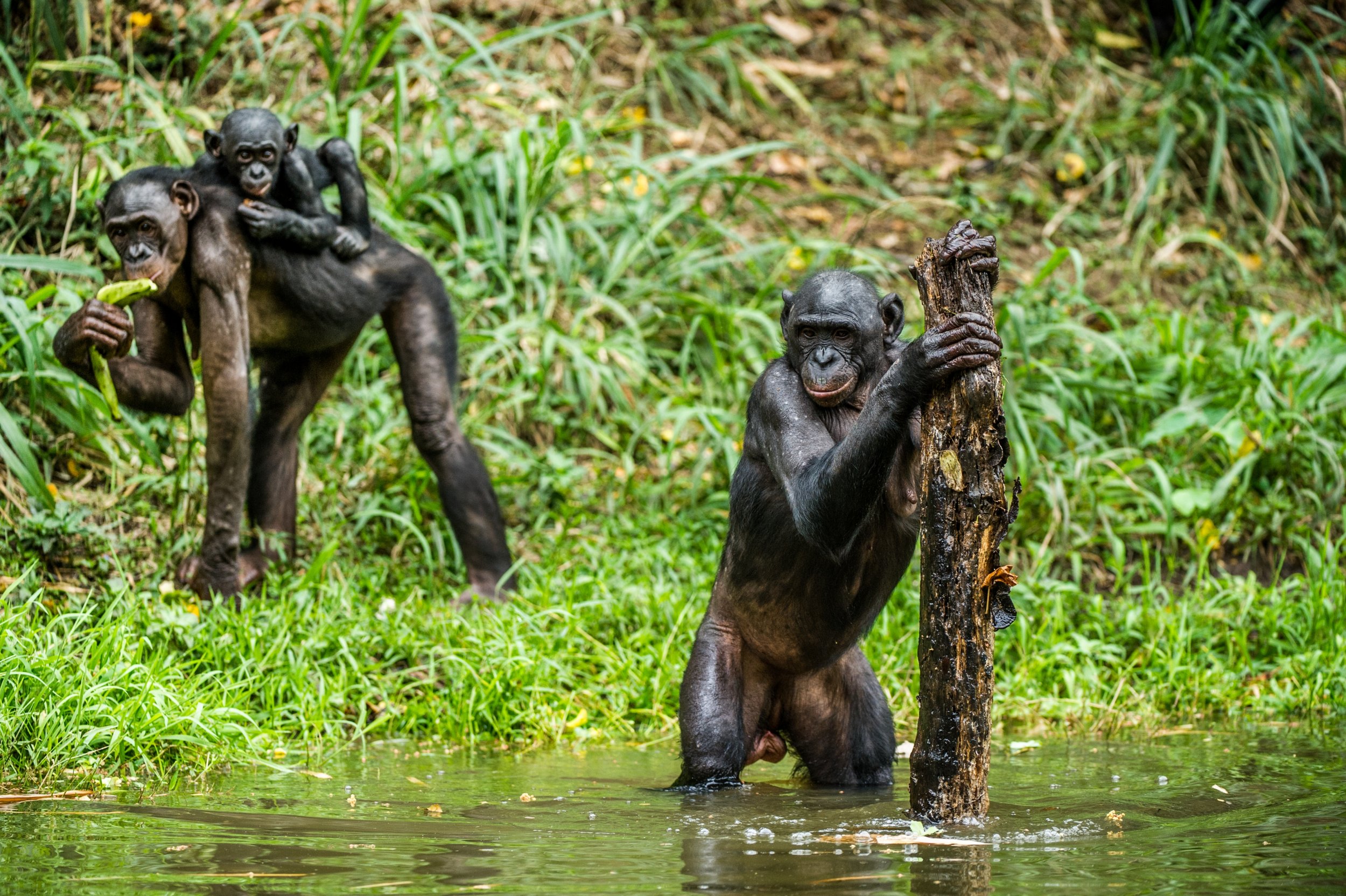
Bonobo mothers help their sons mate in a variety of ways, experts believe, including by directing them toward females who are ovulating.
Scientists studied wild bonobos living in the Democratic Republic of Congo, and compared their behavior to that of chimpanzees in Uganda, Côte d'Ivoire, and Tanzania. Mothers live alongside their sons for their entire lives in both of these species, and the two species' social lives are also similar.
However, the status of females is different. While male and female bonobos are equally dominant in their groups and females are often the highest ranking animal, male chimpanzees are higher up the social ladder.
By observing these animals, the team saw that bonobo mothers go above and beyond to help their sons to mate in ways that chimpanzees don't. Bonobos who lived in a group with a mother were around three times more likely to have children than males who didn't. This trend was not spotted in chimpanzees.
Bonobos were found to take their sons near females who are ovulating, and also prevent other males from interrupting mating sessions. They also group together with their sons to help them secure and maintain a high social status.
The study published in the journal Current Biology provides an insight into the little understood ways that mammalian mothers who live in groups lend their sons a hand when it comes to reproducing. Female orcas, for instance, are also known to help their sons in this way.
Study co-author Martin Surbeck, of the Max-Planck-Institute for Evolutionary Anthropology department of Primatology, told Newsweek the work is important because it shows that females can have a direct influence on the number of grandchildren they have.
"We know that mother bonobos help sons to attain high dominance ranks, we know that mothers influence their sons' copulation rate and that they serve as social passports for their sons to occupy central positions within a group."
This behavior in one of our closest living relatives also has implications for human biology, according to Surbeck, because instead of continuing to have children for as long as we physically can, we tend to focus our attention on the success of a few kids, and later grandkids. And so do bonobos.
"That is intriguing because either it is an independent evolution or represents an ancestral mechanism," he said.
Bonobo mating can also teach us about the effects of a matriarchal society, said Surbeck, as well as "about ways that females express their mating choice when less constrained by male behavior and about potential ways in which bonobo females 'overcame' a potential legacy of male dominance."
Zanna Clay, an expert in primatology at Durham University, who has studied bonobos for over 10 years both in the wild and in captivity, told Newsweek the study was "interesting and well executed."
"A limitation is that we cannot know when precisely conception occurs and whether the mother was really present when her son mated, however the fact that mothers enable their sons to come to the center of the group and thus be close to fertile females supports the general pattern."
She continued: "The influential role that bonobo mothers play and the enhanced power of females in bonobo society is something that is important to communicate to the public, seeing as many people still assume we come from an evolutionary history of male-domination and patriarchal systems."
Last year, a separate study offered another glimpse into the workings of bonobo societies. According to the authors of the study published in the journal Current Biology, the apes are more likely to associate with bullies than helpful individuals in a study where they could choose which type of individual to accept an apple slice from.
"For them, dominance is really important," study co-author Christopher Krupenye, told Newsweek at the time.
This article has been updated with comment from Zanna Clay.
Uncommon Knowledge
Newsweek is committed to challenging conventional wisdom and finding connections in the search for common ground.
Newsweek is committed to challenging conventional wisdom and finding connections in the search for common ground.
About the writer
Kashmira Gander is Deputy Science Editor at Newsweek. Her interests include health, gender, LGBTQIA+ issues, human rights, subcultures, music, and lifestyle. Her ... Read more
To read how Newsweek uses AI as a newsroom tool, Click here.








